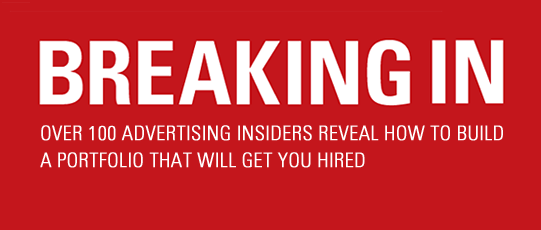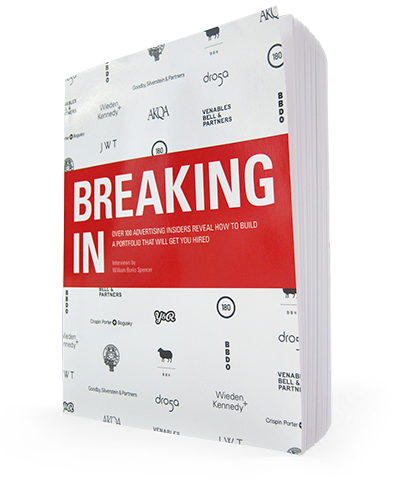Check out some great work from Mark Fitzloff.
WS: What do you look for in a student book? And what impresses you?
MF: I look for intelligence, I think. It’s not so much the packaging, or the choice of media, or necessarily how finished something is, but I look for something that makes me think, “I bet that the person who made that is a smart guy or a smart girl and I just want to learn more about that person.” And I know that’s a bit vague, but I think you have to look at something and go, “Did it take a little bit of wit, or insight, or knowledge of some sort to come up with that solution?” And then I think it’s good. That gets me interested in seeing more.
WS: You said you’re not that concerned about the finish necessarily; do you think sketches can be enough these days, or not?
MF: It’s kind of a sliding scale. I think that I’d be lying if I said that I would prefer something that was unfinished. I think that we all pride ourselves on saying we’re looking for something smart and it doesn’t matter what form it takes. That said, polish can’t hurt. It’s just the old “polishing a turd” cliché that I think is absolutely true—it’s not going to help if the idea’s not there.
But what I wouldn’t suggest is poking at something. I think we do this, whether it’s a student book or an actual commercial you’re working on. It’s like poking at a dead thing on the road: the more you poke at the dead frog, it’s going to start to fall apart. You’ve got that stick and you’re just trying to tweak this, and push that. At best, no one’s going to notice and it won’t really matter. You’re just wasting your time. At worst, you’re actually going to make it worse and it’s going to start to fall apart. So I think that you have to use trusted opinions around you because sometimes you get so close to something that you’re not sure when to say, “Okay, pencils down. This is good enough to communicate the idea–that’s all I need to do.”
Now, there’s lots of different jobs out there. If you’re more design heavy or if you’re hoping to get a studio job [it’s different]. Certainly a lot of art directors would probably have a different answer. They are going to be looking for execution. But as far as I’m concerned, if a sketch can deliver that little flash of genius, or intelligence, then you’re done—time to move to the next thing.
[ … ]
WS: Do you think it’s important to have a long copy campaign in your book?
MF: Actually, I don’t think print is even a factor anymore. Long copy, short copy, or no copy.
WS: Really? So you don’t want to see any print ads at all?
MF: Right. To us, print is a dead medium.
WS: Can you evaluate craft and campaign ideas when they are so intertwined with ideas that are more about how to use technology?
MF: Yeah, I think that’s the challenge. But great ideas done in new media should still be able to demonstrate the same intelligence and ability.
WS: So then is writing important in digital media and do you want to see people demonstrate that in their work?
MF: Yes, exactly. At least for copywriters, there’s no reason why the ability to write can’t come through. Whether it’s literally the copy on a website or their social-media posts or even the way the individual writes about the application or stunt or mobile piece that they’ve chosen to include in their portfolio. Anything you write is an opportunity to demonstrate your writing ability. So it should be used that way.
[ … ]
WS: Do you have any tips for someone who’s trying to get into the business? Either on how to put a book together or how to improve?
MF: I think constant exposure to really good work is absolutely a surefire way of doing it. And I think it’s not just being aware of what’s out there but figuring out little mental exercises for yourself on analyzing why they’re great. So one drill I think is good—it’s actually good for writing in general, and it came to me after doing this as a writer. There is an author that I love, Philip Dick, who is a great short story writer. He’s got a very unique style. So, just as a writing exercise, I tried to start writing Philip Dick short stories. So I’d come up with a concept of the story, the plotline, but then I would try and write it exactly like he would’ve written it. Just to understand how his brain worked. And I think you can do the same thing with ads. I think you can, if you see a spot on television that you love, you can go home and write the script yourself, and look at it and go, “What is it that worked? How did it change from script to execution? What role did the execution play?” But also I think looking at the script is a better way of saying, “What is it about that thing that really struck me?” So it’s not just being exposed to great work and saying, “Yeah I like that” or, “I don’t like that,” but really analyzing it and deconstructing it.
And then, as far as kind of getting a leg up, or making a go of it, I think new technology raises the expectations of juniors these days. As the “media landscape” shifts, the old-timers and the more senior people are going to be looking for people who bring expertise that they don’t have. So being willing—not only being willing, but eager—to take, to tackle the assignments that you know somewhere in the agency people are not capable of doing. There has never been a time like this, I don’t think, for junior folks to be needed for something that they can do, that more senior people just can’t. That is an awesome opportunity. So use it.


Comments are closed.